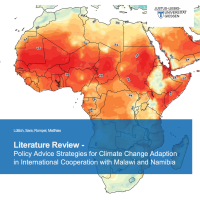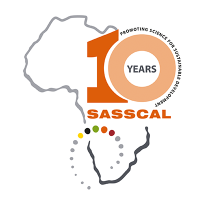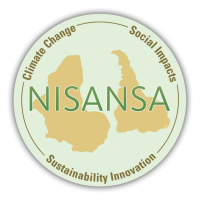climate change social impacts sustainabilty innovation
Willkommen bei NISANSA –
ein BMBF-Verbundprojekt der Philipps-Universität Marburg und der Justus-Liebig Universität Gießen.
Wir ergänzen die Klimawandelforschung um regional- und sozialwissenschaftliche Perspektiven und nehmen dabei den Globalen Süden in den Blick.

***SAVE THE DATE: die zweite internationale NISANSA-Konferenz als transdisziplinäres Forum und in Zusammenarbeit zwischen NISANSA, ARUA und TSITICA am 13. und 14. März in Kapstadt, Südafrika.
Titel: 'Pathways of change in the social response to climate change in unequal societies in Sub-Saharan Africa and Latin America'
Die Frage adäquater sozialer Reaktionen auf Klimawandelfolgen ist eine der zentralen Herausforderungen für die Zukunft.
Das Verbundprojekt NISANSA ergänzt die Klimawandelforschung um regional- und sozialwissenschaftliche Perspektiven und nimmt dabei den Globalen Süden in den Blick.
Das Projekt untersucht, mit welchen Klimawandelfolgen die Gesellschaften des Globalen Südens (südliches Afrika und nördliches Südamerika) konfrontiert sind, welche Potenziale, darauf zu reagieren, bestehen und welche Auswirkungen dies für den globalen Norden, Europa und Deutschland hat.
Forschungsinteresse

Globaler Süden im Fokus
Südliches Afrika (Angola, Botsuana, Malawi, Mosambik, Namibia, Südafrika)
Nördliches Südamerika (Brasilien, Ecuador, Kolumbien, Venezuela)
-
Mit welchen Klimawandelfolgen sind die Länder des globalen Südens konfrontiert?
-
Wie thematisieren sie den Klimawandel und seine Folgen?
-
Welche sozialen Konsequenzen resultieren für diese Regionen und welche Möglichkeiten und Potentiale existieren darauf zu reagieren?
-
Mit welchen Praktiken, Programmen und institutionellen Strukturen wird den Klimawandelfolgen begegnet?
-
Welche Praktiken nachhaltigen Handelns entstehen dabei (Nachhaltigkeitsinnovation)?
-
Und was sind die Folgen für den globalen Norden, Europa und Deutschland?
Diese Fragen untersucht das Verbundprojekt zwischen der UMR und der JLU in transregionaler und vergleichender Perspektive ausgehend vom südlichen Afrika und dem nördlichen Südamerika. Ziel ist es, fundiertes Wissen über die sozialen Konsequenzen der Klimawandelfolgen in diesen Regionen zu generieren.
Das Projekt will damit die aktuelle Klimaforschung systematisch um regional- und sozialwissenschaftliche Perspektiven ergänzen: die Klimaforschung ist vornehmlich durch naturwissenschaftliche Perspektiven und statistische Klimamodelle geprägt. Bei Klimawandel handelt es sich aber nicht nur um klimatologischen und ökologischen Wandel, vielmehr impliziert er politische und kulturelle Antworten und gesellschaftliche Transformationen.
In insgesamt sieben Teilprojekten (SP) geht das interdisziplinäre Verbundprojekt zwischen der Philipps-Universität Marburg und der Justus-Liebig-Universität Gießen seit Juli 2021 diesen Fragen in Ländern des südlichen Afrikas (Angola, Botswana, Malawi, Mosambik, Namibia, Südafrika) und des nördlichen Südamerikas (Brasilien, Ecuador, Kolumbien, Venezuela) nach.
Aktuelles

Publication
März 2022
Policy Advice Strategies for Climate Change Adaption in International Cooperation with Malawi and Namibia
Sara Lüttich & Matthias Rompel
Teilprojekt 7

SASSCAL
21. April 2022, Windhoek Namibia
SASSCAL to celebrate 10 years of excellence in climate change research

1. NISANSA Symposium
21. April 2022
Das 1. NISANSA-Symposium findet am 11.07.2022 in der Philipps-Universität Marburg statt. Weiter Informationen folgen in Kürze.
One of the participants of our international NISANSA classroom, Liza, tells us her key learning out of our class in Marburg:
“When I think back about the seminar, I remember having the most interesting conversations and debates with the most interesting people!
To get to know all these different aspects of Anthropology and to look at climate change adaptation measures from different perspectives really changed the way I think about the topic!
Together we learned how complex the causes and effects of climate change are, how deeply they are connected to different groups of people and what possibilities we have to create a future for ourselves that is truly substainable!
Huge thanks to the Team of Nisansa for organizing this seminar!“
With this post subproject 3 says goodbye! We hope you enjoyed following us along during our international NISANSA classroom in Marburg.
#nisansaconnections #nisansainternational

One of the participants of our international NISANSA classroom, Liza, tells us her key learning out of our class in Marburg:
“When I think back about the seminar, I remember having the most interesting conversations and debates with the most interesting people!
To get to know all these different aspects of Anthropology and to look at climate change adaptation measures from different perspectives really changed the way I think about the topic!
Together we learned how complex the causes and effects of climate change are, how deeply they are connected to different groups of people and what possibilities we have to create a future for ourselves that is truly substainable!
Huge thanks to the Team of Nisansa for organizing this seminar!“
With this post subproject 3 says goodbye! We hope you enjoyed following us along during our international NISANSA classroom in Marburg.
#nisansaconnections #nisansainternational
...
Meet our fellow Alexander Rodriguez Contreras from Santa Marta, Colombia!
He tells us about his experiences during NISANSA:
During the development of the NISANSA project in the northern region of Colombia, we had the opportunity to explore the diversity of the territories and their realities, strengthen the bonds of brotherhood and work with the communities that inhabit them, learn from their experiences and share their knowledge in other latitudes through the audiovisual material.
The NISANSA project brings us closer to ways in which climate change is expressed in the diversity of communities that inhabit this world 🌎
#nisansainternational #nisansaconnections

Meet our fellow Alexander Rodriguez Contreras from Santa Marta, Colombia!
He tells us about his experiences during NISANSA:
During the development of the NISANSA project in the northern region of Colombia, we had the opportunity to explore the diversity of the territories and their realities, strengthen the bonds of brotherhood and work with the communities that inhabit them, learn from their experiences and share their knowledge in other latitudes through the audiovisual material.
The NISANSA project brings us closer to ways in which climate change is expressed in the diversity of communities that inhabit this world 🌎
#nisansainternational #nisansaconnections
...
Meet our fellow Dr. Eliana Teles from Brazil. (seated in the middle on the first photo).
She is an anthropologist from Pará, Brazil.
She concludes on her experiences during NISANSA and her visits for our joint class here in Marburg with the following words:
“The phrase NISANSA gave us the opportunity to realize that maintaining a sense of community is essential for tackling the climate crisis. And for a brief moment in the life of the city of Marburg, it brought together diversity and multiculturalism, when different people and voices had the opportunity to talk and think together about proposals and methodologies for a problem that is common to all of us.“
- Eliana Teles
#nisansaconnections

Meet our fellow Dr. Eliana Teles from Brazil. (seated in the middle on the first photo).
She is an anthropologist from Pará, Brazil.
She concludes on her experiences during NISANSA and her visits for our joint class here in Marburg with the following words:
“The phrase NISANSA gave us the opportunity to realize that maintaining a sense of community is essential for tackling the climate crisis. And for a brief moment in the life of the city of Marburg, it brought together diversity and multiculturalism, when different people and voices had the opportunity to talk and think together about proposals and methodologies for a problem that is common to all of us.“
- Eliana Teles
#nisansaconnections
...
Documentary - Resilientes
Last wednesday we met at Gartenwerkstatt Marburg and had the chance to watch a documentary filmed by our fellow Alexander Rodriguez Contreras from Colombia.
The documentary looks at differnt forms of local resistance and resilience in the nothern carribean of Colombia. The voice is given to local people and communities to talk about their strategies to fight climate change on a local level. After watching the documentary we also had the chance to ask Alexander Rodriguez Contreras about specific aspects of the documentary.
During our stay at Gartenwerkstatt Marburg we did not only watch the documentary, we also had a guided walk around the garden and learned how climate change is affecting the local realities and the gardening projects in Marburg. With a warm meal and some drinks on the terrace we had the opportunity to connect between anthropology students, our international fellows and other guests who joined us for the event. #nisansaconnections

Documentary - Resilientes
Last wednesday we met at Gartenwerkstatt Marburg and had the chance to watch a documentary filmed by our fellow Alexander Rodriguez Contreras from Colombia.
The documentary looks at differnt forms of local resistance and resilience in the nothern carribean of Colombia. The voice is given to local people and communities to talk about their strategies to fight climate change on a local level. After watching the documentary we also had the chance to ask Alexander Rodriguez Contreras about specific aspects of the documentary.
During our stay at Gartenwerkstatt Marburg we did not only watch the documentary, we also had a guided walk around the garden and learned how climate change is affecting the local realities and the gardening projects in Marburg. With a warm meal and some drinks on the terrace we had the opportunity to connect between anthropology students, our international fellows and other guests who joined us for the event. #nisansaconnections
...
Meet our fellow Jemusse Abel Ntunduatha from Mozambique.
What is your key learing out of the NISANSA Project?
„My key learning out of the NISANSA porject is first of all the knowledge about climate change and the local strategies of restistence we got to know during our research and fieldwork. Furthermore for me the fieldwork was a unique experience and it was great to be in interaction with communities and learn from them about their daily life.“ #nisansaconnections

Meet our fellow Jemusse Abel Ntunduatha from Mozambique.
What is your key learing out of the NISANSA Project?
„My key learning out of the NISANSA porject is first of all the knowledge about climate change and the local strategies of restistence we got to know during our research and fieldwork. Furthermore for me the fieldwork was a unique experience and it was great to be in interaction with communities and learn from them about their daily life.“ #nisansaconnections
...
Connectedness
My most striking experience and most significant insight in Nisansa was the all-encompassing existence of interconnectedness.
1. We observe interconnectedness when stuyding the local realities of climate change: effects are always intertwined with a multitude of further challenges and preconditions arising from large-scale infrastructure projects and extractivism, capitalist incentives for development, but also structural inequalities in terms of ethnicity, class and gender. They all contribute to what climate change really means in the local reality.
2. Our international research team has proven how important and valuable joint research may be - joint research, that unites us in interconnectedness based on our shared visions for a good, common future.
3. We finally found people from so different places and different contexts interconnected in the common dialogue on climate change during the research, in our workshops and the conferences in Colombia and South Africa, and finally in our course here in Marburg.
In times when right-wing parties are gaining more and more influence - as we are witnessing in Europe and beyond - it is all the more important to remember our interconnectedness that is able to transcend national, cultural, or other fictional borders.
#nisansaconnections

Connectedness
My most striking experience and most significant insight in Nisansa was the all-encompassing existence of interconnectedness.
1. We observe interconnectedness when stuyding the local realities of climate change: effects are always intertwined with a multitude of further challenges and preconditions arising from large-scale infrastructure projects and extractivism, capitalist incentives for development, but also structural inequalities in terms of ethnicity, class and gender. They all contribute to what climate change really means in the local reality.
2. Our international research team has proven how important and valuable joint research may be - joint research, that unites us in interconnectedness based on our shared visions for a good, common future.
3. We finally found people from so different places and different contexts interconnected in the common dialogue on climate change during the research, in our workshops and the conferences in Colombia and South Africa, and finally in our course here in Marburg.
In times when right-wing parties are gaining more and more influence - as we are witnessing in Europe and beyond - it is all the more important to remember our interconnectedness that is able to transcend national, cultural, or other fictional borders.
#nisansaconnections
...
Approaching Social Dimensions of Climate Change in Mozambique, Brazil and Colombia
The course provides an insight into our anthropological research within the scope of the Nisansa project. Our research focus is on the social dimensions of climate change, in particular on local conceptions and the multiple strategies that communities find to adapt and to react within the specific socio-political conditions in their region. During the seminar students in their own presentations first explored the different localities where we did our research. Later we presented our fieldsites and local climate change realities and explored anthropological and interdisciplinary methods for assessing social dimensions of climate change. These methodologies include visual anthropology, social cartography and collaborative research in an international team. Finally in our session next we will discuss our results, theoretical thoughts and research obstacles.
Even with some language barriers we had many enriching discussions between students and all our international fellows. #nisansaconnections #nisansadialogue #nisansaexperiences

Approaching Social Dimensions of Climate Change in Mozambique, Brazil and Colombia
The course provides an insight into our anthropological research within the scope of the Nisansa project. Our research focus is on the social dimensions of climate change, in particular on local conceptions and the multiple strategies that communities find to adapt and to react within the specific socio-political conditions in their region. During the seminar students in their own presentations first explored the different localities where we did our research. Later we presented our fieldsites and local climate change realities and explored anthropological and interdisciplinary methods for assessing social dimensions of climate change. These methodologies include visual anthropology, social cartography and collaborative research in an international team. Finally in our session next we will discuss our results, theoretical thoughts and research obstacles.
Even with some language barriers we had many enriching discussions between students and all our international fellows. #nisansaconnections #nisansadialogue #nisansaexperiences
...
Hello from subproject 3! We are realizing an international NISANSA-Classroom in Marburg.
To transform global power relations, such maps are only a first step. In terms of methodologies and perspectives, postcolonial approaches have already changed a lot in the academic world. Still, the funding logic of many research projects in Germany continues to prevent collaborative international research on an equal footing, as the majority of positions and travel funds are reserved for the German partners.
In order to counteract this, we invited our international team from Brazil, Mozambique and Colombia to join us in Marburg, this time. Together, we will hold a class on our findings, methods and research elaborated during our NISANSA project.
In the following weeks we - Dr. Eliana Teles Rodrigues, Jemusse Abel Ntunduatha, Alexander Rodriguez Contreras and Dr. Michaela Meurer - want to take you along our joint class.
We will present you our central class topic, student perspectives and key learnings of all participating researchers.
Come along and acompany us on our international class journey in Marburg! #nisansadialogue #nisansaconnections

Hello from subproject 3! We are realizing an international NISANSA-Classroom in Marburg.
To transform global power relations, such maps are only a first step. In terms of methodologies and perspectives, postcolonial approaches have already changed a lot in the academic world. Still, the funding logic of many research projects in Germany continues to prevent collaborative international research on an equal footing, as the majority of positions and travel funds are reserved for the German partners.
In order to counteract this, we invited our international team from Brazil, Mozambique and Colombia to join us in Marburg, this time. Together, we will hold a class on our findings, methods and research elaborated during our NISANSA project.
In the following weeks we - Dr. Eliana Teles Rodrigues, Jemusse Abel Ntunduatha, Alexander Rodriguez Contreras and Dr. Michaela Meurer - want to take you along our joint class.
We will present you our central class topic, student perspectives and key learnings of all participating researchers.
Come along and acompany us on our international class journey in Marburg! #nisansadialogue #nisansaconnections
...
The Asociación Integral Campesina de Tunjuelo, Dintá y San Ignacio, located in the municipality of Gámeza, Boyacá, was created to improve food security.
Each farm has small greenhouses with food plants.
They are currently starting to plant live fences with trees that provide organic matter to the pastures and at the same time they imagine it as a biological corridor that in the future will allow the fauna and vegetation of the high and middle zones to find a habitat to live in #nisansaactions; #nisansamethods

The Asociación Integral Campesina de Tunjuelo, Dintá y San Ignacio, located in the municipality of Gámeza, Boyacá, was created to improve food security.
Each farm has small greenhouses with food plants.
They are currently starting to plant live fences with trees that provide organic matter to the pastures and at the same time they imagine it as a biological corridor that in the future will allow the fauna and vegetation of the high and middle zones to find a habitat to live in #nisansaactions; #nisansamethods
...
In the La Ortiga Natural Reserve (southern Nariño-Colombia), the Muellamués Indigenous Reservation is protecting water sources. There, the Pumamaki Indigenous Association has sought to recover the soils, previously over-exploited, by planting seedlings in strategic areas.
They state that "it has been a constant learning process" because initially they also planted species with invasive potential, but now they only propagate and plant native species in different arrangements.
Their interest is to measure the changes that these practices have generated in the ecosystem by monitoring biodiversity (plants and birds) and the effect on their recovery. #nisansamethodologies; #nisansaconcepts; #nisansaactions

In the La Ortiga Natural Reserve (southern Nariño-Colombia), the Muellamués Indigenous Reservation is protecting water sources. There, the Pumamaki Indigenous Association has sought to recover the soils, previously over-exploited, by planting seedlings in strategic areas.
They state that "it has been a constant learning process" because initially they also planted species with invasive potential, but now they only propagate and plant native species in different arrangements.
Their interest is to measure the changes that these practices have generated in the ecosystem by monitoring biodiversity (plants and birds) and the effect on their recovery. #nisansamethodologies; #nisansaconcepts; #nisansaactions
...
Solutions to deforestation from rural schools
Actions of subproject 1 are part of the School Environmental Project (PRAES in Spanish) of the Sagrado Corazón Educational Institution, which monitors a restoration area created during the "Sustainable South" Project funded by UNDP in 2018.
This is an optimal scenario to study the impacts of deforestation, as well as the changes in climate cycles and their effects on the socio-ecosystems of páramo and high Andean forest. #nisansaconcepts; #nisansamethods; #nisansaactions

Solutions to deforestation from rural schools
Actions of subproject 1 are part of the School Environmental Project (PRAES in Spanish) of the Sagrado Corazón Educational Institution, which monitors a restoration area created during the "Sustainable South" Project funded by UNDP in 2018.
This is an optimal scenario to study the impacts of deforestation, as well as the changes in climate cycles and their effects on the socio-ecosystems of páramo and high Andean forest. #nisansaconcepts; #nisansamethods; #nisansaactions
...
